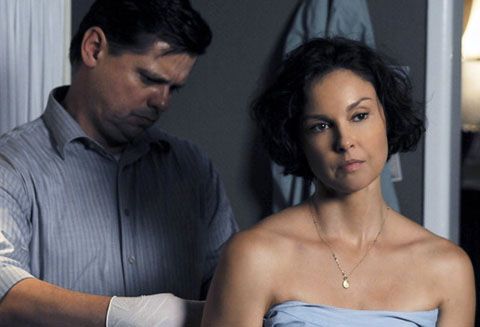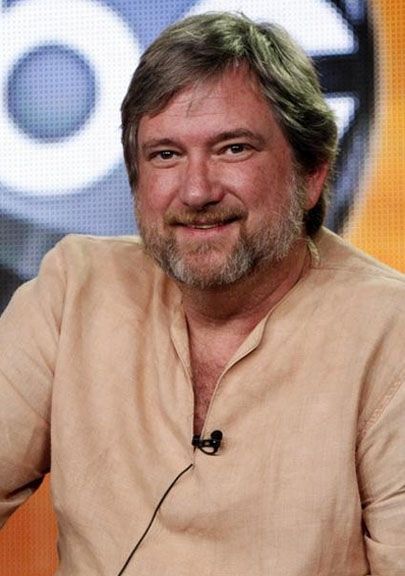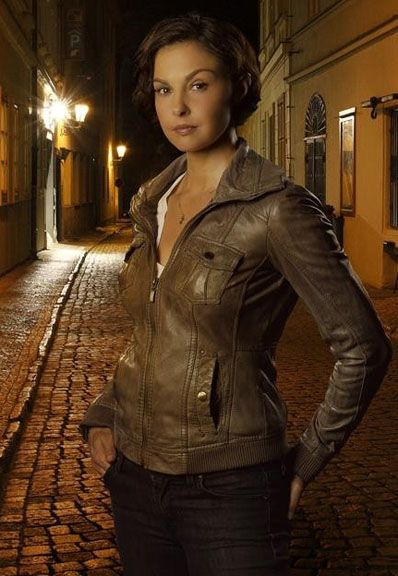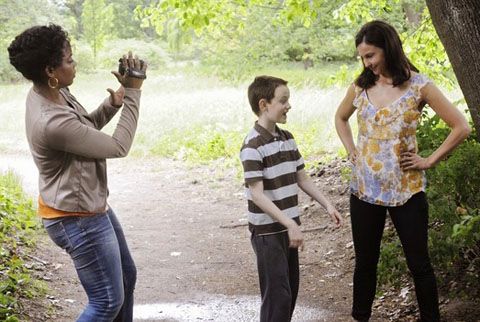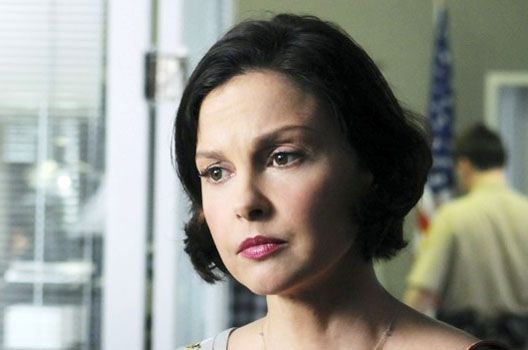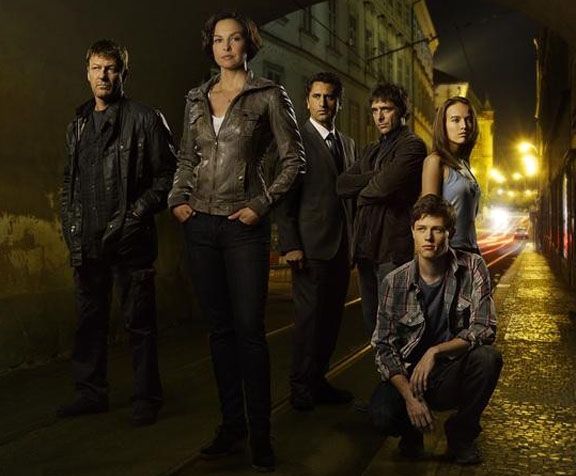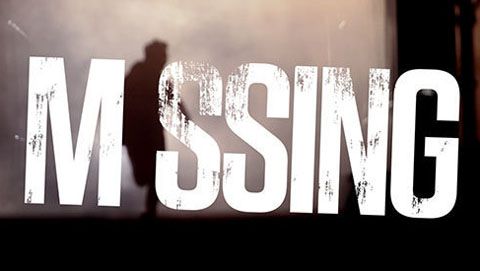ABC’s action-packed drama series Missing (premiering on March 15th) tells the story of Becca Winstone (Ashley Judd), a woman who learns that her son (Nick Eversman) has disappeared while studying abroad. Immediately suspecting foul play, she travels to Rome to begin piecing together the clues left behind. And, it isn’t long before the kidnappers realize that they’ve picked a fight with the wrong woman, as Becca has a secret of her own – she happened to be a lethal CIA operative. If she wants to find her son alive, Becca will have to rely on old friends and put all of her old skills to the test. The series also stars Sean Bean (Game of Thrones), Cliff Curtis (Trauma), Adriano Giannini (Oceans Twelve) and Tereza Vorísková (Borgia).
During this exclusive interview with Collider, creator/executive producer Gregory Poirier (National Treasure: Book of Secrets) talked about what made him want to try his hand at television, having to map out the entire season for the network in order to get a greenlight without having to film a pilot first, why 10 episodes was the perfect amount, the process of figuring out what countries to set this story in, what made Ashley Judd the perfect leading lady, and the plan for where Season 2 could go. He also talked about working on the second draft of a big action movie about the secret service training program that people go through to become agents. Check out what he had to say after the jump:
Collider: How did this come about? Did the initial idea come from something you had wanted to do?
GREGORY POIRIER: Well, it was interesting because I’ve mostly written features. This is my first television experience. I have been wanting to do television for a long time, but I didn’t want to just jump in and do anything. I’ve been waiting for the right idea, where I felt like I could really live with these characters and spend time with them. The initial germ of the idea actually came from my co-executive producers, Gina Matthew and Grant Scharbo. I’ve known Gina for years, from the days when we met at a party. We’ve always looked for a way to work together, and she called me up and said, “What do you think of this idea of this woman whose son goes missing, and it turns out she’s not what she seems to be?” And I said, “That sounds great.” So, we got together and talked it out a little bit, and then I took it from there and developed it into a story.
At what point did you decide that it was going to be 10 episodes?
POIRIER: I actually like it because it was the best of both worlds. It was almost like doing a 10-hour movie. It wasn’t trying to cram everything into an hour and a half or 100 minutes, but it also wasn’t to the point where we had to stretch it out so much that it became watered down. I think it was a really nice number to do. Plus, it would have been really cost-prohibitive to shoot 24 of these overseas, and we really wanted to do it in an authentic way, bringing in quality actors and actors from the different places that we went. Adriano Giannini is a huge movie star over there, and we were able to get him because he could do this and still have his movie career. It was the same with Ashley [Judd]. She would never commit to doing a 24-episode show, but the length of what we’re doing is perfect for her because she can do this and still have her life.
How soon did you figure out what countries this would be set in, so that you could incorporate each place into the story?
POIRIER: We really wanted to do that. There were a couple of considerations that we put into picking the places that we did. The most important one, of course, was, “How does this fuel and fit with the story?” And then, because we were based in Prague, we wanted to choose cities where, if we found that we were missing something but couldn’t go back, we could double it in Prague, if we needed to. That was also a consideration. We picked the European cities based on what we could do in Prague, if we had to. That was part of it as well. The dream of this has always been, God willing and with success, each season would take place somewhere on a different continent, and we’d just go around and see the world with this show.
When writing features, you spend all this time writing a script, but you don’t know if it will ever get a greenlit. What’s it like to know that, with this show, what you write will pretty much make it to the screen?
POIRIER: I was talking to Grant Scharbo and he said, “What are you working on now?,” and I said, “Well, I’m getting ready to start the second draft of this movie I’m doing at Universal.” He laughed and said, “You went on a research trip for that, before we started. In between your research trip and starting the second draft, we shot a whole season of television.” The instant gratification of it is really exciting to me.
Which project are you starting the second draft of?
POIRIER: It’s a project about the secret service training program that they go through to become agents. It’s going to be fun. It’s going to be a big action movie.
Does it come easy for you, to write this type of big action?
POIRIER: It’s interesting because I never was a big action writer. My first film was Rosewood, which was a total historical drama. It had violence in it, but it wasn’t an action movie, by any stretch of the imagination. Then, I did Gossip and The Lion King 2, and all these things that were not action movies. It’s just recently that, for some reason, that aspect has taken off. For me, the key to it, and what really attracted me to Missing, in particular, is that the characters and story are what’s important. The action is the window dressing. In features, sometimes you come at it from the opposite side, which is that the action is the point of the movie and the character arc is the window dressing.
This is the other way around. This is a chance to really dig into these characters. We approached every episode from the standpoint of, “What is the family dynamic we’re exploring in this episode?” Whether it’s about her family or someone else’s family, or whatever, every aspect of this show has to do with family, how the family manifests, and how the parents effect the children, and vice versa. We also approach every episode by saying, “Before we talk about plot, what is the emotional through-line and theme of this episode, and how is that going to inform everything else that we do?” It really was a great experience, for a writer. Television is much better for a writer than features.
Because viewers will learn her history and backstory throughout the episodes, did you have to figure that out first and map out how much you’d reveal in each episode?
POIRIER: We had a really unique situation because we got the network to greenlight us without shooting a pilot. We basically went to them and said, “It makes no sense for us to go over there and spend a bunch of money shooting a pilot, and then come back, and then have to go back again to wrap everything up. The only way to make this show feasible is to amortize the cost over all 10 episodes.” In order to get them to pull the trigger and say, “Okay, go make your 10 episodes,” we basically had to tell them what was going to happen, all the way down the road. So, we were in the unique position of essentially having to break the entire season before we started. Obviously, some of that changed as we went, but overall, we had to be very prepared and we had to be able to pitch what happens in Episodes 8 and 9, and how it all wraps up in Episode 10.
In setting up the story of a mother searching for her son, is it challenging to determine how many times you can get away with her almost getting to him?
POIRIER: Yeah, and we actually don’t do that. We do that in a couple of episodes, but we don’t do it in every episode. We don’t do that all the way through. We’re trying to be a little more authentic than that.
Are there episodes that are more focused on the backstory?
POIRIER: There are two things that develop as the season goes on. One is that the past becomes very heavy in the present, so we end up doing a lot of flashback stuff with Becca and with her husband Paul, which is why we were able to get an actor like Sean Bean. And then, the other thing that happens is that, starting in Episode 3, we start to follow Michael’s story, and actually see where he is, who has him and what’s going on. We follow his story parallel to her story, which is nice because we have a great young actor, Nick Eversman, and we found this amazing Czech actress, Tereza Vorísková. The two of them have a full-on storyline that goes alongside. It’s not out of sight, out of mind. You do follow Michael’s story, as Becca is looking for him.
What made Ashley Judd the perfect actress for this lead role?
POIRIER: I fell in love with her when she was on Star Trek, when she was 17 or something. She’s just amazing. She has so much soul to her. Honestly, she was our first choice. I know ever creator says that about their lead, but it’s absolutely true. She was the prototype for this role. It’s a number of things. She has an ability to show a depth of character, but also a vulnerability, and she can show her pain. At the same time, she can kick ass. She gave me the luxury of being able to write a really complex character because she can go so many different places.
When you have a character like that, that’s so layered and strong, is it difficult to find an actor for the husband, who can play against that and balance that out?
POIRIER: It is, and it’s an especially difficult situation when you’re only showing their life together, 10 years ago. We just lucked out, cast wise, with this. We got on the phone with Sean Bean and pitched the character to him, and he signed on. It was very fortuitous. It wasn’t the kind of thing where we went down the road with a lot of actors. People responded. Once we had Ashley Judd, people responded because we had Ashley Judd. It made it a lot easier to put the rest of the pieces in place.
When you have a female lead on an action series, do you have to take into account how much you have her get her ass kicked by men?
POIRIER: Yeah, and we really didn’t hold back much. We have episodes where she goes through some really heavy stuff. It goes to that authenticity thing. We didn’t want to be the show where the bad guy’s bullets never hit, and the good guy shoots everybody, but the bad guy can’t hit a wall. We didn’t want to do that. We wanted to be authentic about it, and the truth of the matter is that she would get roughed up and she would have bad things happen to her. We don’t shy away from it. We have her in some pretty hairy situations, in this first season. She’s definitely not your average housewife. She’s tough, but she is human, and I like that about it.
Once Ashley Judd was cast, did she give you any input into what she would and wouldn’t do?
POIRIER: She’s a human rights activist and an abolitionist, and she’s got these causes that are important to her. One of the things she said, early on, was, “I realize that, as this character, I will have to kill people occasionally and I will have to hurt people, but I don’t want to be just running around, gunning people down. I value life, and I want my character to value life as well.” So, we tried to bear that in mind.
She’s not Bruce Willis, killing everything that sticks its head in the door. She wrestles with issues, like whether to not someone over in exchange with her son. It’s not all cut and dry for her. It’s a constant process of, “How far will she go?” We push her a little bit further and further, in every episode, until she almost reaches a breaking point in Episode 10. It’s cool. She definitely had a lot of input into it. We also talked to her about how to incorporate the social causes that are important to her. They’re in some episodes in the first season, and we’d like to incorporate them in a bigger way, in future seasons, if we go forward.
Did you have to start planning for a Season 2, while doing Season 1?
POIRIER: Yeah, we definitely did. The female character that her son, Michael, becomes involved with in his story, sets up a big issue that we can deal with in the second season, if we need to. We do deal with a little bit of the human trafficking issue and whether torture is an acceptable way to get information out of people. Some of that stuff will be even stronger, as we go forward. Part of the reason that Ashley signed on to this show, honestly, was because we told her that we would address those things and she would have the opportunity to get that message out there.
What is your process, as a writer?
POIRIER: I have all my tricks. Writers have all their tricks. I do certain things. For one thing, I make sure I write five pages every day, come hell or high water. Even if they’re total crap, I write them. If I have to go back and rewrite them later, I will, but I write everyday, regardless. I also start each day by going back and rewriting the pages I wrote the day before. I call them my “on ramp” pages. I go back and get up-to-speed, working on yesterday’s pages. It’s easier than launching in to new stuff. Honestly, discipline is the hardest part of this whole thing. I wrote Episode 10, sitting on the set, in a director’s chair while we were shooting Episodes 5 and 6. It’s definitely different than writing a movie.
Is it fun to have other people to collaborate with and work off of?
POIRIER: It is. It’s just amazing to me because, in movies, you rewrite people and you get rewritten, but it’s not a collaborative thing, like this is. To be able to sit in a room and break these stories down, and then to be able to say, “Okay, these characters that I created and then put in this situation are now going off and doing these things that these other people are coming up with,” it’s just amazing to watch. It really is.
Having had this experience now, do you want to do more TV, whether it’s more seasons of Missing, or something else entirely?
POIRIER: Absolutely, yeah. I’m very sold on this. I like it a lot. I want to do more, for sure.
What initially drew you to writing? Did you just always want to be a storyteller?
POIRIER: I had a very unorthodox childhood. I grew up on a hippie commune in Hawaii, in a jungle with no shoes. I was always very creative. I was always writing stories. When I was about 11 or 12, I got involved with theater and started acting. I always knew that I was going to wind up in some aspect of storytelling, but I didn’t really figure out that it was writing until a little bit later, in my college years. I thought I might be an actor or a director, but writing was the one that asserted itself.
Do you still have any desire to direct, like perhaps with an episode of the show?
POIRIER: I might except that I am so busy on this show already. I can’t imagine adding another responsibility to it. And, I have directed. I directed one feature, and I enjoy it. But, this is a different kind of creative endeavor and I’m really enjoying what I’m doing right now, so it’s not high on my list.
Missing will air on Thursday nights on ABC, starting on March 15th.

